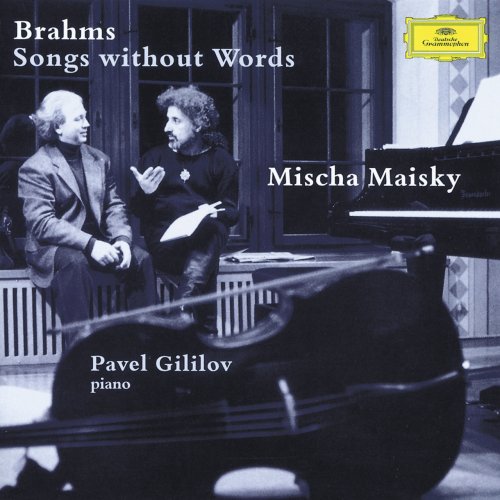
Mischa Maisky, Pavel Gililov - Brahms: Songs without Words (1997)
BAND/ARTIST: Mischa Maisky, Pavel Gililov
- Title: Brahms: Songs without Words
- Year Of Release: 1997
- Label: Deutsche Grammophon
- Genre: Classical
- Quality: FLAC (tracks)
- Total Time: 01:08:27
- Total Size: 294 Mb
- WebSite: Album Preview
Tracklist:
01. Brahms: Songs without words - Lerchengesang op. 70 No. 2
02. Brahms: Sapphische Ode, Op.94, No.4
03. Brahms: Wie Melodien zieht es mir, Op.105, No.1
04. Brahms: Songs without words - Nicht mehr zu dir zu gehen op. 32 No. 2
05. Brahms: Songs without words - Denn es gehet dem Menschen wie dem Vieh op.121 No.1
06. Brahms: Songs without words - Ich wandte mich und sahe an op. 121 No. 2
07. Brahms: Songs without words - O Tod, wie bitter bist du op. 121 No. 3
08. Brahms: Songs without words - Über die Heide op. 86 No. 4
09. Brahms: Songs without words - Liebestreu op. 3 No. 1
10. Brahms: Immer leiser wird mein Schlummer, Op.105, No.2
11. Brahms: Sonata for Violin and Piano No.1 in G, Op.78 - 1. Vivace ma non troppo
12. Brahms: Sonata for Violin and Piano No.1 in G, Op.78 - 2. Adagio
13. Brahms: Sonata for Violin and Piano No.1 in G, Op.78 - 3. Allegro molto moderato
14. Brahms: Nachklang, op.59, No.4
Performers:
Mischa Maisky, cello
Pavel Gililov, piano
01. Brahms: Songs without words - Lerchengesang op. 70 No. 2
02. Brahms: Sapphische Ode, Op.94, No.4
03. Brahms: Wie Melodien zieht es mir, Op.105, No.1
04. Brahms: Songs without words - Nicht mehr zu dir zu gehen op. 32 No. 2
05. Brahms: Songs without words - Denn es gehet dem Menschen wie dem Vieh op.121 No.1
06. Brahms: Songs without words - Ich wandte mich und sahe an op. 121 No. 2
07. Brahms: Songs without words - O Tod, wie bitter bist du op. 121 No. 3
08. Brahms: Songs without words - Über die Heide op. 86 No. 4
09. Brahms: Songs without words - Liebestreu op. 3 No. 1
10. Brahms: Immer leiser wird mein Schlummer, Op.105, No.2
11. Brahms: Sonata for Violin and Piano No.1 in G, Op.78 - 1. Vivace ma non troppo
12. Brahms: Sonata for Violin and Piano No.1 in G, Op.78 - 2. Adagio
13. Brahms: Sonata for Violin and Piano No.1 in G, Op.78 - 3. Allegro molto moderato
14. Brahms: Nachklang, op.59, No.4
Performers:
Mischa Maisky, cello
Pavel Gililov, piano
Although the profound soul-stirring that sits at the very core of the Sapphische Ode only partially translates to a solo cello, Brahms’s skill as the mellowest of melodists and Mischa Maisky’s warming sound palette still manage to convey some of its poetic essence. My main problem here is not with the transcriptions – most of them work rather well – or, indeed, with Maisky’s tone, but with a manner of phrasing that is too ‘clean’ for what should be a soaring top line. If you turn to Pierre Fournier’s 1942 recording of Brahms’s song Feldeinsamkeit for comparison (an uncredited transcription included as part of EMI’s “Les introuvables de Pierre Fournier”) you will notice how a judicious and subtle use of portamento lifts the leading melody back on to a vocal plane. Maisky himself recalls various past masters in DG’s booklet, but time and again I felt that his all-too-formulaic shifts from note to note were inhibiting the kind of singing quality that a more pronounced slide would have achieved almost as a matter of course. No degree of graded vibrato (a Maisky speciality) has quite the same effect.
Needless to say, all the greatest Lieder singers – I am thinking especially of Kipnis, Erb, Schumann, Lehmann, Husch and Fischer-Dieskau – employed varieties of portamento to highly musical effect. Best here, perhaps, are the delicate Lerchengesang and Liebestreu, each approximating treasurable short movements from a larger piece; but elsewhere the switch from voice to bow ideally demands rather more in the way of phrasal and inflexional variety than Maisky has on offer. Clean, sonorous projection works far better in Paul Klengel’s useful transcription of the G major Violin Sonata, save that some awkward octave transpositions and a ruinous shift from soloist to piano at 7'09'' into the Adagio (one of the most mysterious passages in the Sonata, especially when the violinist holds the top line) rather spoil the effect. Otherwise, this CD is a pleasant, somewhat monotonous ‘mood setter’ that suggests more interpretative potential than it actually realizes. Pavel Gililov provides well-characterized accompaniments and the recordings are excellent.'
Needless to say, all the greatest Lieder singers – I am thinking especially of Kipnis, Erb, Schumann, Lehmann, Husch and Fischer-Dieskau – employed varieties of portamento to highly musical effect. Best here, perhaps, are the delicate Lerchengesang and Liebestreu, each approximating treasurable short movements from a larger piece; but elsewhere the switch from voice to bow ideally demands rather more in the way of phrasal and inflexional variety than Maisky has on offer. Clean, sonorous projection works far better in Paul Klengel’s useful transcription of the G major Violin Sonata, save that some awkward octave transpositions and a ruinous shift from soloist to piano at 7'09'' into the Adagio (one of the most mysterious passages in the Sonata, especially when the violinist holds the top line) rather spoil the effect. Otherwise, this CD is a pleasant, somewhat monotonous ‘mood setter’ that suggests more interpretative potential than it actually realizes. Pavel Gililov provides well-characterized accompaniments and the recordings are excellent.'
DOWNLOAD FROM ISRA.CLOUD
Mischa Maisky Pavel Gililov Brahms Songs without Words 97 2705.rar (294.87 MB)
Mischa Maisky Pavel Gililov Brahms Songs without Words 97 2705.rar (294.87 MB)
As a ISRA.CLOUD's PREMIUM member you will have the following benefits:
- Unlimited high speed downloads
- Download directly without waiting time
- Unlimited parallel downloads
- Support for download accelerators
- No advertising
- Resume broken downloads


